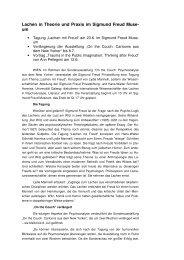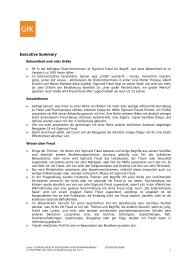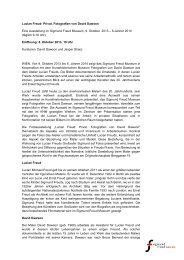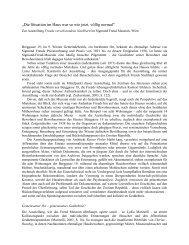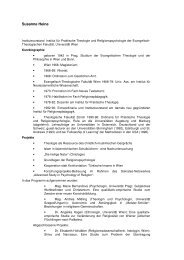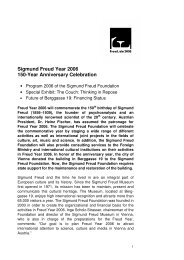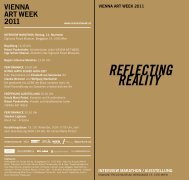Sigmund Freud-Museum | Newsletter - Sigmund Freud Museum Wien
Sigmund Freud-Museum | Newsletter - Sigmund Freud Museum Wien
Sigmund Freud-Museum | Newsletter - Sigmund Freud Museum Wien
Create successful ePaper yourself
Turn your PDF publications into a flip-book with our unique Google optimized e-Paper software.
wall of solidarity, explaining: “We’re neither software nor hardware. We’re your parents.” The issue is<br />
the irreducibility of human beings and human meaning. We are back to the family, to the life cycle, to<br />
human fragility and experience.13 We are back to the elements of psychoanalytic culture.<br />
With the turn of the millennium, we came to the end of the <strong>Freud</strong>ian century. It is fashionable to argue<br />
that we have moved from a psychoanalytic to a computer culture, that there is no need to talk about<br />
<strong>Freud</strong>ian slips now that we can talk about information processing errors. In my view, however, the<br />
very opposite is true.<br />
We must cultivate the richest possible language and methodologies for talking about our increasingly<br />
emotional relationships with artifacts.<br />
We need far closer examination of how artifacts enter the development of self and mediate between<br />
self and other. Psychoanalysis provides a rich language for distinguishing between need (something<br />
that artifacts may have) and desire (which resides in the conjunction of language and flesh). It provides<br />
a rich language for exploring the possibility of the irreducibility of human meanings. Finally, to come<br />
full circle, with the reinterpretation of <strong>Freud</strong>ian slips in computational terms – with the general shift<br />
from meaning to mechanism – there is a loss of the notion of ambivalence. Immersion in programmed<br />
worlds and relationships with digital creatures and robotic pets puts us in reassuring microworlds<br />
where the rules are clear. But never have we so needed the ability to think, so to speak,<br />
“ambivalently,” to consider life in shades of gray, to consider moral dilemmas that aren’t battles for<br />
“infinite justice” between Good and Evil. Never have we so needed to be able to hold many different<br />
and contradictory thoughts and feelings at the same time. People may be comforted by the notion that<br />
we are moving from a psychoanalytic to a computer culture, but what the times demand is a passionate<br />
quest for joint citizenship.<br />
Sherry Turkle |<br />
Sherry Turkle is a clinical psychologist and professor for the sociology of science at the Massachusetts<br />
Institute of Technology. She received her doctorate at Harvard for a work on Jacques Lacan’s role in<br />
the history of French psychoanalysis, which was published in 1978 under the title Psychoanalytic<br />
Politics: <strong>Freud</strong>’s French Revolution (New York: Basic Books). In the ’80s she began her exploration<br />
of the interaction between people and computers. With the books The Second Self: Computers and the<br />
Human Spirit (New York: Simon and Schuster, 1984) and Life on the Screen: Identity in the Age of<br />
the Internet (New York: Simon and Schuster, 1995; in German: Leben im Netz. Identität im Zeichen<br />
des Internet, Reinbek bei Hamburg: Rowohlt, 1998) she contributed influential studies on the<br />
psychical effects of new technologies.<br />
* Sherry Turkle presented this text as the <strong>Sigmund</strong> <strong>Freud</strong> Lecture on 6 May 2002 at the<br />
University of Vienna.<br />
1 <strong>Sigmund</strong> <strong>Freud</strong>, “Slips of the Tongue,” in The Psychopathology of Everyday Life, in The<br />
Standard Edition of the Complete Psychological Works of <strong>Sigmund</strong> <strong>Freud</strong>, vol. 6, ed. and trans.<br />
James Strachey, London: Hogarth Press, 1960, pp. 53–105.<br />
2 I came into that class as a student of psychoanalytic culture in terms of the sociology of<br />
sciences of mind. I went on to study how computers carry ideas about mind, how the computer<br />
becomes an evocative object for thinking about the self.<br />
See Sherry Turkle, Psychoanalytic Politics: Jacques Lacan and <strong>Freud</strong>’s French Revolution,<br />
New York: Guilford Press, 2nd revised edition, 1992, and The Second Self: Computers<br />
and the Human Spirit, Cambridge, MA: MIT Press, 2nd revised edition, forthcoming.<br />
3 Sherry Turkle, “Psychoanalysis and Artificial Intelligence: A New Alliance,” Daedalus, 117/1<br />
(Winter 1988).<br />
4 Donna Haraway, “A Cyborg Manifesto,” in Simians, Cyborgs and Women, New York:<br />
Routledge, 1991.



